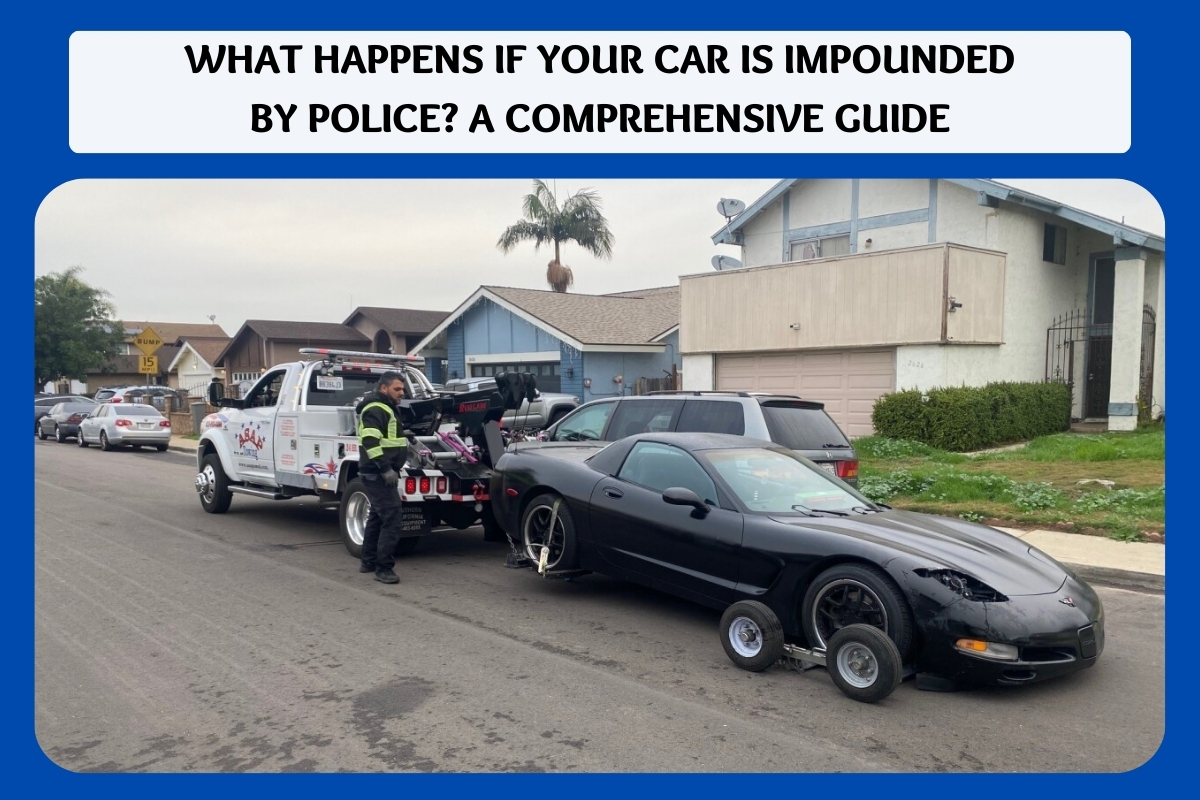What Happens If Your Car Is Impounded by Police? A Comprehensive Guide

Getting your car impounded by the police can be a stressful and frustrating experience. It means your vehicle has been legally seized and taken to an impound lot by law enforcement officers. In this detailed guide, we’ll cover everything you need to know about vehicle impoundment, from the reasons behind it to the process of reclaiming your car.
Some of the key points we’ll discuss include:
- Common reasons why the police may impound your car
- The vehicle impoundment process and typical fees involved
- Your legal rights during an impoundment
- Steps to take to get your car back from the impound lot
- Situations where impound fees may be waived
- Police searches of impounded vehicles
- Tips to avoid hefty impound fees
By the end of this guide, you’ll have a clear understanding of what happens if your car is impounded by the police and how to navigate this process effectively.
Common Reasons for Vehicle Impoundment
There are several reasons why the police may decide to impound your vehicle. Let’s explore some of the most common ones:
Unpaid Parking Tickets and Fines
If you’ve accumulated unpaid parking tickets or other fines, the authorities can impound your car as a way to enforce payment. Ignoring these fines can lead to your vehicle being legally seized and towed to an impound lot.
Involvement in Criminal Activities
The police can impound your car if it is suspected of being used in a crime or containing illegal items.
Vehicle Deemed Unsafe or Unregistered
If your vehicle is deemed unsafe for road use, either due to mechanical issues or expired registration, the police may impound it until these problems are resolved.
Blocking Traffic or Abandonment
Your car can be towed and impounded if it is blocking traffic, illegally parked obstructing vehicles or pedestrians, or appears abandoned on a public road or highway.
The Vehicle Impoundment Process
When the police decide to impound your car, there’s a specific process they follow:
How Police Impound Your Car
The first step is for the officers to legally seize your vehicle and arrange for a tow truck to transport it to an impound lot. During this process, you may or may not receive prior notice, depending on the circumstances.
Receiving Notification and Fees
Once your car is impounded, you will be notified of the impoundment and informed of the fees you need to pay to reclaim your vehicle. These fees typically include towing and storage costs.
Typical Impound Lot Charges
The average cost of towing is around $150, while impound fees can range from $75 to $300 per day that your car is kept in the lot. It’s crucial to act quickly, as these fees can accumulate rapidly, making it more expensive to retrieve your vehicle.
Legal Rights During Impoundment
Even though your car has been impounded, you still have certain legal rights:
Right to Prompt Notice
The authorities are required to provide you with prompt notice of the impoundment, informing you of the reasons behind it and the steps you need to take to reclaim your vehicle.
Opportunity for a Hearing
In most cases, you have the right to request a hearing to determine if the impoundment was lawful. This hearing ensures that the authorities cannot hold your property or charge you fees without due process.
Procedures to Request Release
Depending on the state or jurisdiction, there are specific procedures you can follow to request the release of your vehicle from the impound lot. This may involve filing a motion or asking for a court order.
Getting Your Car Back
Once you’ve been notified of the impoundment, there are steps you need to take to retrieve your vehicle:
Locating the Impound Lot
The first step is to locate the impound lot where your car is being held. You can usually find this information online or by contacting the police department or towing company directly.
Required Documentation
To reclaim your vehicle, you’ll need to provide certain documentation, such as a valid driver’s license, proof of registration, proof of insurance, and any towing or impound fees.
Paying Fees to Reclaim Vehicle
After presenting the required documentation, you’ll need to pay the accumulated towing and storage fees to the impound lot. It’s essential to do this as soon as possible to avoid further charges.
When Impound Fees May Be Waived
In certain situations, you may not be responsible for paying the impound fees:
Illegal or Unlawful Impoundment
You may not owe towing or impound fees if the impoundment of your vehicle was illegal or unlawful, such as when the police did not have proper grounds to seize your car.
Vehicle Stolen Before Impoundment
If your car was stolen and then impounded by the police, you are typically not responsible for paying the fees, as you were not in control of the vehicle at the time.
Owner Not at Fault for Crime
When your car is impounded because it was used in a crime by someone else, like a robbery, the person convicted of that crime usually has to pay the impound fees, not the owner.
Police Searches of Impounded Vehicles
When the police impound your vehicle, they can search it without a warrant or probable cause:
“Inventory Searches” for Safekeeping
The police can conduct what’s called an “inventory search” to document the contents of your car for safekeeping purposes. This search is allowed even for a short-term impoundment.
Evidence of Criminal Activity
If the police find evidence of criminal activity during their search, such as illegal drugs or weapons, they can use this as grounds for further investigation or charges against you.
Avoiding Hefty Impound Fees
To minimize the financial impact of an impoundment, it’s essential to act quickly:
Acting Quickly to Retrieve Car
The longer your car remains in the impound lot, the more fees you’ll accumulate. Retrieving your vehicle as soon as possible can save you significant amounts of money.
Consequences of Delayed Retrieval
The tow truck company can legally sell your vehicle if you don’t reclaim it within a certain timeframe to recover unpaid fees.
The Bottom Lines
Having your car impounded by the police can be a frustrating and costly experience. However, understanding your rights and the proper procedures can help mitigate the stress and financial burden.
Remember to act quickly if your car is impounded, as delays can lead to hefty fees and even the potential loss of your vehicle. Be prepared to provide the necessary documentation and pay the required fees to reclaim your car from the impound lot.
By following the steps outlined in this guide, you’ll be better equipped to navigate the process of getting your car back if it’s ever impounded by the police.






